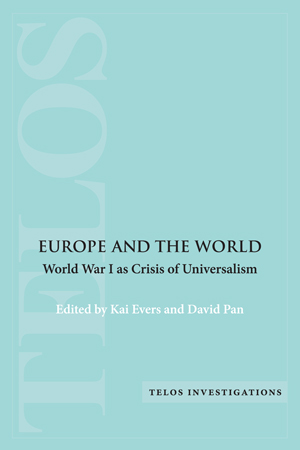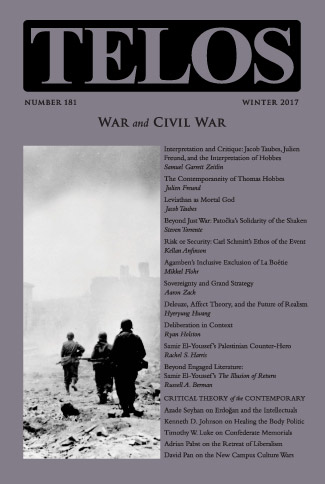By Telos Press · Tuesday, May 1, 2018 New from Telos Press: Europe and the World: World War I as Crisis of Universalism, edited by Kai Evers and David Pan. Order your copy in our online store, and save 20% on the list price by using the coupon code BOOKS20 during the checkout process.
 With contributions by Étienne Balibar, Annette Becker, Russell Berman, Jörn Leonhard, among many others, Europe and the World: World War I as Crisis of Universalism focuses within Europe on the conflicts between nationalism and cosmopolitanism as a universalist political project and globally on the conflicts between European imperial politics and universal ideals. This collection of essays probes how these conflicts defined the war as the transition point to a new structure of global relations and postcolonial understandings of cultural identity. The volume’s first part considers the history of European universalism and how it affected the lead-up to the war. The second part analyzes how universalist goals affected the conduct of the war itself. While August 1914 marked a simultaneous turning point in Europe, Africa, and Asia, the war ended without such global synchronicity. Instead, it gave way to a wide variety of new spaces and chronologies of violence on a global level. Part three offers case studies of how representations of the war affected its remembrance and the way such war stories subverted or fit into different national narratives. The contributions in part four investigate different ways in which the experience of war and mass violence affected national cultures and notions of universalism in the United States and within Europe. With contributions by Étienne Balibar, Annette Becker, Russell Berman, Jörn Leonhard, among many others, Europe and the World: World War I as Crisis of Universalism focuses within Europe on the conflicts between nationalism and cosmopolitanism as a universalist political project and globally on the conflicts between European imperial politics and universal ideals. This collection of essays probes how these conflicts defined the war as the transition point to a new structure of global relations and postcolonial understandings of cultural identity. The volume’s first part considers the history of European universalism and how it affected the lead-up to the war. The second part analyzes how universalist goals affected the conduct of the war itself. While August 1914 marked a simultaneous turning point in Europe, Africa, and Asia, the war ended without such global synchronicity. Instead, it gave way to a wide variety of new spaces and chronologies of violence on a global level. Part three offers case studies of how representations of the war affected its remembrance and the way such war stories subverted or fit into different national narratives. The contributions in part four investigate different ways in which the experience of war and mass violence affected national cultures and notions of universalism in the United States and within Europe.
Continue reading →
By Steven Torrente · Wednesday, January 31, 2018 Steven Torrente’s “Beyond Just War: Jan Patočka’s Solidarity of the Shaken” appears in Telos 181 (Winter 2017). Read the full article at the Telos Online website, or purchase a print copy of the issue in our online store. Individual subscriptions to Telos are now available in both print and online formats.
The just war tradition has for a long time provided the categories and logic used to debate the tensions inherent in armed conflict. If war and killing are seen as both inevitable and undesirable, some system of limitation must be developed. Just war concepts such as right authority, just cause, and others offer a framework of off-ramps on the road to nihilistic violence. However, critics contend that just war theory fails to negotiate a real compromise between naïve pacifism and unrestrained war. They argue that the just war tradition not only reduces to the unrestrained pole, but in fact it can legitimate and exacerbate war. If so, just war thinking suffers from a logical contradiction—it facilitates that which it seeks to limit.
Continue reading →
By Russell A. Berman · Wednesday, December 13, 2017 Telos 181 (Winter 2017): War and Civil War is now available for purchase in our store.
 Consider the question: has American political life ever been as polarized as it is today? If the most appropriate answer is: yes, of course, in 1861, then the problem has been named and we are left with little comfort. The evaporation of anything like a bipartisan consensus in the political class leaves us staring at a battlefield, with few common bonds or shared attachments. Politics has become the internalization of war by other means. This is our version of the crisis of parliamentary democracy that Schmitt described in the Weimar years. Congressional Democrats are unwilling to cross the aisle to find room for compromise in the Trump era, but this only repeats the animosity among Republicans toward the Obama agenda eight years ago. Each party seeks its own advantage, which exclusively means the other party’s disadvantage, as the national good slips beneath the horizon. Each party focuses on mobilizing its base for votes and fund-raising, which means that each has an irresistible incentive to avoid solving those problems that are the most effective vehicles for rallying their supporters: when they held the majority, the Democrats preferred to keep the “dreamers” vulnerable, so as to be able to recycle them in future campaigns, just as the Republicans chose to punt on health care. Each issue is too successful in attracting voters, too valuable to give up. Consider the question: has American political life ever been as polarized as it is today? If the most appropriate answer is: yes, of course, in 1861, then the problem has been named and we are left with little comfort. The evaporation of anything like a bipartisan consensus in the political class leaves us staring at a battlefield, with few common bonds or shared attachments. Politics has become the internalization of war by other means. This is our version of the crisis of parliamentary democracy that Schmitt described in the Weimar years. Congressional Democrats are unwilling to cross the aisle to find room for compromise in the Trump era, but this only repeats the animosity among Republicans toward the Obama agenda eight years ago. Each party seeks its own advantage, which exclusively means the other party’s disadvantage, as the national good slips beneath the horizon. Each party focuses on mobilizing its base for votes and fund-raising, which means that each has an irresistible incentive to avoid solving those problems that are the most effective vehicles for rallying their supporters: when they held the majority, the Democrats preferred to keep the “dreamers” vulnerable, so as to be able to recycle them in future campaigns, just as the Republicans chose to punt on health care. Each issue is too successful in attracting voters, too valuable to give up.
Continue reading →
By Timothy W. Luke · Thursday, May 11, 2017 Assessing asymmetric wars in the abstract is a problematic task, even though most are “small wars” fought by “big nations.” Armed conflicts with these characteristics brim with persistent, undeclared, and low-intensity violence. It rarely is extinguished, and the lingering injuries sustain even more violence on the same scale. Many of these small wars began in Asia, Africa, Latin America, or the Middle East during, or not long after, World War II. Armed resistance there never completely ended; instead it intensified with decolonization and/or postcolonial state failure. Now virtually institutionalized in many violent wild zones around the world, low-intensity wars also flare up as asymmetric conflicts between rich countries and poor peoples, Westernized nations and anti-Western movements, liberal democratic states and illiberal theocratic insurgents after 1989.
Continue reading →
By Sarah Earnshaw · Tuesday, March 21, 2017 In response to a speech given by Obama in 2013 on his administration’s counterterrorism policy, popularly referred to as his “drone speech,” General William Nash commented that Obama “has begun the transition from a perpetual war to a more normalized security framework.” I address this normalization of the categorization and control of life within a global threatscape. Much of the debate at policy level, in academia, and on the flickering screens of media outlets surrounding the contemporary fixture of the counterterror arsenal, the drone, focuses upon the legal and ethical implications. Administration officials continually stress the need for “transparency” and the president’s wish that the United States hold itself to “the highest possible standards” in the conduct of a just, humanitarian war—reminding us this is indeed a war, against an organization and its affiliates.
Continue reading →
By Andrew M. Wender · Wednesday, March 8, 2017 If the phrase “asymmetrical warfare” is taken to connote scenarios where “one side is possessed of overwhelming power with respect to its adversary,” together with manifold embodiments “of asymmetry in media representations, ideology, religion, sub- and supra-national actors, the environment and even psychology,” then there would appear little doubt that today’s world is pervaded by such conflict. Necessarily, the unique historical conditions of the present, globalizing era—with its fragmenting as well as revanchist states, and its dizzying technological accelerations—are evoked by “new wars” that embroil a proliferation of non-state actors, along with states who believe that they should rightly monopolize (or be immune from, as the case may be) such asymmetrical modalities as nuclear arsenals, mercenary forces, drones, cyberattacks, and propaganda innovations.
Continue reading →
|
|
 With contributions by Étienne Balibar, Annette Becker, Russell Berman, Jörn Leonhard, among many others, Europe and the World: World War I as Crisis of Universalism focuses within Europe on the conflicts between nationalism and cosmopolitanism as a universalist political project and globally on the conflicts between European imperial politics and universal ideals. This collection of essays probes how these conflicts defined the war as the transition point to a new structure of global relations and postcolonial understandings of cultural identity. The volume’s first part considers the history of European universalism and how it affected the lead-up to the war. The second part analyzes how universalist goals affected the conduct of the war itself. While August 1914 marked a simultaneous turning point in Europe, Africa, and Asia, the war ended without such global synchronicity. Instead, it gave way to a wide variety of new spaces and chronologies of violence on a global level. Part three offers case studies of how representations of the war affected its remembrance and the way such war stories subverted or fit into different national narratives. The contributions in part four investigate different ways in which the experience of war and mass violence affected national cultures and notions of universalism in the United States and within Europe.
With contributions by Étienne Balibar, Annette Becker, Russell Berman, Jörn Leonhard, among many others, Europe and the World: World War I as Crisis of Universalism focuses within Europe on the conflicts between nationalism and cosmopolitanism as a universalist political project and globally on the conflicts between European imperial politics and universal ideals. This collection of essays probes how these conflicts defined the war as the transition point to a new structure of global relations and postcolonial understandings of cultural identity. The volume’s first part considers the history of European universalism and how it affected the lead-up to the war. The second part analyzes how universalist goals affected the conduct of the war itself. While August 1914 marked a simultaneous turning point in Europe, Africa, and Asia, the war ended without such global synchronicity. Instead, it gave way to a wide variety of new spaces and chronologies of violence on a global level. Part three offers case studies of how representations of the war affected its remembrance and the way such war stories subverted or fit into different national narratives. The contributions in part four investigate different ways in which the experience of war and mass violence affected national cultures and notions of universalism in the United States and within Europe. 







